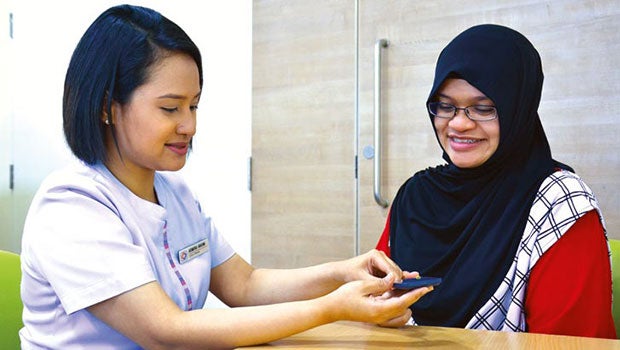
Asmira Bte Mohamed Rahim, guides a pregnant patient on the self-administered finger-prick test to monitor her blood sugar levels.
In Singapore, up to one in five women are at risk of Gestational Diabetes Mellitus (GDM), a condition that puts them at an increased risk of certain conditions during pregnancy, including the development of high blood pressure, incidence of preterm labour, maternal complications and the development of Type 2 Diabetes Mellitus (T2DM) in their lifetime.
Despite the risks, about 90% to 95% of women with GDM do not undergo regular check-ups after delivery to ascertain if their condition has resolved, in a bid to monitor their diabetes condition. They also do not maintain a routine screening for T2DM, of at least once every three years.
In September 2017, the KK Women’s and Children’s Hospital, as well as the Temasek Foundation Cares, introduced the Temasek Foundation Cares GDM Care programme to improve the detection, care and support for this vulnerable group.
It aims to pilot a novel model of care to encourage all pregnant women who receive antenatal care in the KK Women’s and Children’s Hospital to undergo a GDM screening. It also encourages them to receive appropriate antenatal and postnatal care, as well as to engage in follow-up sessions to track and manage their diabetes condition.
The $1.09 million programme aims to benefit about 5,400 women with GDM and their families over a three-year period.
“The incidence of GDM is rising globally due to an increasing average age for child-bearing, as well as an increased prevalence of obesity in the population, exposing both the mother and the baby to increased health and mortality risks,” explains the programme lead, Professor Tan Kok Hian, who is also the Head and Senior Consultant at the Perinatal Audit and Epidemiology Unit, Department of Maternal Fetal Medicine, KK Women’s and Children’s Hospital.
“Children born from pregnancies affected by GDM tend to be big babies weighing more than four kilogrammes at birth, putting them at a higher risk of suffering birth trauma and a lack of glucose in the bloodstream, which can lead to long-term negative health effects. They also have higher risks of developing obesity and T2DM later in life,” Prof Tan adds.
Subsidies will also be provided to women who require further financial assistance to optimise care for themselves and their families.
“The Temasek Foundation Cares GDM Care programme is truly a welcome boost to our ongoing efforts to enhance care and to improve the health for women and children.
With the early detection, timely intervention and close follow-up care afforded by this structured care and education programme, we are closer to optimising the prevention and management of diabetes and its associated health risks for our future generations,” says Prof Tan.
THE PROGRAMME AND ITS BENEFICIARIES
Under the pilot programme, all expectant mothers in the KK Women’s and Children’s Hospital are offered the routine GDM screening between 24 and 28 weeks of gestation.
Expectant mothers with GDM are also guided by a team of Diabetes Care Navigators in observing a care plan for optimal management of the condition, to achieve the best outcomes for both the mother and child.
Educational support will be provided to the patients and their families during pregnancy and after delivery to encourage healthier lifestyles and to minimise the health risks arising from a pregnancy affected by GDM.
If the condition persists after delivery, they can be referred to a network of care partners for further evaluation and for the follow-up management of their condition.
For more information on the Temasek Foundation Cares GDM Care programme, please contact the KKH Obstetrics Day Assessment Centre at 6394 2097.













 Get it on Google Play
Get it on Google Play